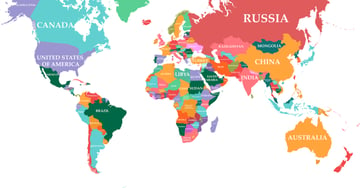 There was a time when most people lived their entire lives in one or two area codes. That has changed dramatically. With the internet and easy travel, people are moving further away and more often. When you’re trying to hire the best job candidates, you may find they’ve spent significant time living, studying, or working in another country. Just ordering a background check on the current county or state they reside in now may miss something. How can you make sure their background check returns all the information you need to see?
There was a time when most people lived their entire lives in one or two area codes. That has changed dramatically. With the internet and easy travel, people are moving further away and more often. When you’re trying to hire the best job candidates, you may find they’ve spent significant time living, studying, or working in another country. Just ordering a background check on the current county or state they reside in now may miss something. How can you make sure their background check returns all the information you need to see?
International screening is your answer. Luckily, it’s becoming more common to search other countries for information about your applicant. You just need to know what to expect and how to do it correctly.
They Typically Take Longer
United States checks take 72 hours or less, depending on the type of background check you want on the applicant. Checking criminal and driving records, verifying education and employment, and completing reference checks may take much longer in other countries.
They Might Not Be Complete
Issues with privacy laws and rules vary by country, making them more complex and difficult to navigate. Some countries offer the same information as the U.S. while others won’t give out any information at all. And, depending on the country, the government may not keep accurate or thorough records, so some information could return as incomplete.
International Background Checks May Require More Documentation
Foreign countries may require identification and additional documentation. Varying privacy laws and information gathering standards, are the reasons. It’s a smart practice to gather as much information on the candidate as possible on the front end, like their date of birth, the dates he or she resided in the foreign country, and their address. This data helps maximize the chances of receiving accurate international background checks.
Specific Country Rules Differ
A key mistake we see with employers who order international background checks on applicants who have lived in other countries is they don’t ask questions up front. Requesting information on a particular country, its laws, and the type of information their companies, schools, and courts will and won’t divulge is key to keeping your background screening process moving forward productively. Be sure to talk with your background screening provider before you order an international screen, so you know what to expect. This helps to proactively plan your hiring strategy.
Your Governing Background Check Policy Still Applies
Employers understand that a uniform, consistent hiring protects their company against discrimination claims and negligent hiring lawsuits. When possible, compare the same information on everyone.
For example, if you’re verifying a job seeker’s employment history within the United States, you should make every effort to verify their employment history if an applicant lived abroad. While it may not always be possible to receive the same in-depth information that U.S. based schools provide (such as dates of attendance, major, grades, etc.) store documentation that shows you made a valid effort to compare apples to apples when screening applicants for the same position.
In the current marketplace, more people are living at least some part of their lives abroad. What they did while they were out of the country could weigh into whether you want to hire them. HR professionals must adapt their hiring and background screening policies to include and vet this segment of the job seekers. Using international screening helps ensure each candidate is checked in a uniform, thorough manner.
Other posts you might be interested in
View All Posts
7 Questions Your Background Screener Should Be Able to Answer for You
Read More
Around the World in A Day: Screening Your International Job Candidates
Read More
